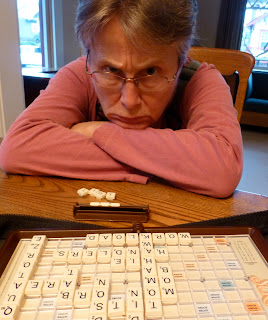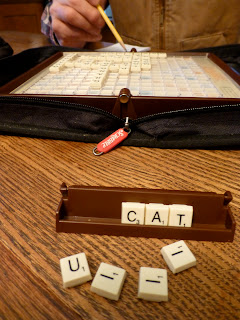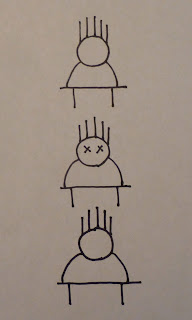Five hours into my eight-hour layover in LAX, I have begun a new game of Travel Scrabble with my companion. Travel Scrabble is compact and ridgy so that the tiles will snap into place and not become dislodged if the board were to, say, suddenly sail through the air toward the Cinnabon dumpster. The board is clear. I have one vowel and two possible three-letter words. I had already decided to take at least fifteen minutes for my turn in order to give my companion some much-needed time for reflection. After a minute I have bored myself and snapped down my word. My companion leans back, cracks his fingers, and settles in like a bear in winter. I drift.
We are in the international airport. The Estee Lauder ad for Perfectionist wrinkle lifting serum shines from every single wall. But wait! Could it be? They are not the same. Yes: each one is in a different language. A completely different alphabet! My lord. It is the Rosetta Stone. Right here in LAX. A good scholar could, given enough time, discover the key that unlocks almost any language. Could discover how to say “New! The first wrinkle lifting serum to use CP+R technology” in every tongue known to mankind. Right next to the English version is an ad using some kind of characters. Letters in our alphabet correspond to sounds, so that speech can be transcribed. Characters may have nothing to do with sounds. They’re called characters because they’re like little personalities all to themselves. They’re pictures. Of things, mostly. So there may be a stroke that depicts “tree” and another that depicts “woman” and we’re supposed to know if this character represents Mother Nature or Dry, Scaly Skin. Not only that, but instead of reclining comfortably across the page like letters, the characters are strung up by the neck, and it’s up to us to see how they’re hanging. The system is almost completely inscrutable to all but about two billion people, so this is a rare opportunity for someone with a lot of time between flights to crack the code.
It’s not easy. The stroke for tree, for instance, can mean tree, or maybe, because of implied height, “basketball-player,” and the stroke for sky can mean sky, or, possibly, the concept of “strategy,” which apparently used to sound like the word for sky a few centuries ago; and with the addition of a small dash halfway up the tree-stroke on the right (“squirrel”), suggesting quick movement, gives us the character tree-squirrel-sky, or “pick-and-roll offense.” Not to be confused with the character with the squirrel-dash placed higher near the sky (“bat”) or at the base of the tree (“plummet,” “rabies,” or “a walk in the park”). It is a system without mercy. Sloppy penmanship dooms the author to obscurity.
This Rosetta-Stone business is serious scholarly work. It takes a lot of concentration, and there is no guarantee a person can pursue it and prevail at Scrabble too, especially when playing with a man who has no sense of the passage of time. Especially when he has a nicer rack.
Look! There is a whole little mob of characters on the Korean version, all corresponding to the compact English “New!” I study, and after a few hours, its mystery is revealed: Dear Leader on a pedestal, Dear Leader on a pedestal with X’s over his eyes, and then Dear Leader on a pedestal again. A native speaker will get it right away. But what a load to lug around, in place of new!–a slim dart of a word from a git-er-done language. New! Crisp, sharp, pins its meaning to the mat and rolls off, ready for action. Yeah, baby. That’s my language. Big, muscular, agile English, all swagger and punch, and home to a thumping vocabulary, a treasury of words stolen from everyone and everywhere, the echoes of one conquered people after another. And words admired from a thousand voyages and stashed into the luggage on the way home. They’re all ours now, nimble, sly, supple, and all of them slingable. Like the choice chunk of Middle English that I could sling at this Scrabble game right now. If I had a “U.”




I bet "tree-squirrel-sky" and "pick-and-roll offense" characters are the same. That would be logical. I am such a geek that when I went to the UK, I was one of the first 10 in line to get into whatever building it was where the Rosetta Stone lives (they all ran together after awhile) and I got tears in my eyes when I saw the actual Stone itself. Same thing for the Magna Carta. History gives me goosebumps.
Me too, but only now. When I was surrounded by historical artifacts, growing up in the shadow of the Smithsonian, I couldn't have cared less.
A Great Moment in Life came when I introduced an American teenager to the Rosetta Stone in person. He didn't get the import at first but caught on quickly, eyes got BIG, and he said "And they let us TOUCH it?" Sometimes it rocks to be a teacher!
BC
They DO let you touch it??
If I had been born in a country with a representational written language, I'd be a functional illiterate. I cannot do that stuff at all. Understanding that has made me more sympathetic to people who have never conquered reading, though. I guess they must have the other-side-of-the-coin version of what I've got. Words on the page just don't convey meaning to them the way they do to me. I can happily live with my deficit, although it does make operating household appliances and electronics a bit of a challenge.
Doesn't it though? I vacillate between wanting my instructions in pictograms or five hundred different languages. Come to think of it, your average appliance instruction booklet is a Rosetta Stone, too.
But the appliance instruction booklets set a bigger challenge because none of it is in English. Or not enough for me to work out how to use the expletive appliance anyway.
You may have found the solution to the up til now impossibly difficult problem of translating the Voynich Manuscript. Cryptologists and codebreakers who have struggled for years only had to post copies on the walls of LAX to achieve complete understanding within the period of an 8 hour layover.
Oh! Thanks. I'd never heard of it. Looks like it's from Middle Earth. Learn something new every day. (Forget it the next…)
🙂
Wow. Dave really does take a long time to play, doesn't he. Another couple of hours in that airport and you might have CREATED another language. Good stuff!
Oh he is very deliberate. De-lib-er-ate. He almost always wins, too, and I'm supposed to be the word person.
Scrabble is a strategy game pretending to be a word game.
I can strategicate if I have to.
I suppose I could play games with a partner who has a nicer rack…. as long as they let me win now and then…
There's nothing wrong with your rack, Odd!
I know a keen knitter who so admired Chinese script she worked up a snazzy sweater with the sign for a lavatory knitted across the front.
I've heard some pretty good stories about people tattooing characters in odd places and thinking they mean "serenity" and the like. And being not correct about that.
The allegedly pictographic nature of Chinese characters isn't much help, even to native speakers. For example, the first character in the poster in your picture means "all" or "complete", but it looks like a combination of the symbol for "person" with the symbol for "king" or "jewel". If there's some logic by which that suggests the concept of "all", it's not obvious to me.
Most Chinese characters include an element that hints at pronunciation, but again, it's usually not too useful even to native speakers. The characters were fixed in their present form between one and two thousand years ago, and the pronunciation of Chinese has changed a lot since then.
The characters reflect the mind-set of the culture that produced them. For example, the symbol for "woman" repeated three times forms the character for "noisy".
Oh, and Korean writing is an alphabet, believe it or not. Instead of writing their letters in a string like we do, they group them into clumps, one clump per syllable, because they got their idea of what writing is supposed to look like from the Chinese.
Hey, it could have been worse. You could have been trying to play Scrabble in Chinese.
Wow, Inf (may I call you Inf?), you sound like you've had some very very long layovers! I don't have much problem with the three women meaning "noisy." Would three men be a Conclave, or a Circle Jerk?
And do the Chinese have to live without word games?
This reminds me of one of your earliest stories. As a college student, you were traveling through France with a group of people. For some reason, there was no lodging to be found. You finally found a hotel that had only one room left. But, the hotelier gently discouraged you from taking it, saying that it would be too crowded for your entire group to sleep in the only remaining room. Trying to snag the precious remaining room, you cheerfully reassured him, "Je peux coucher sur le plafond." Instead of explaining that you could sleep on the floor if necessary, you stated that you could sleep on the ceiling! I guess the moral of this story is: if you're going to buy make-up in an international airport, you'd better be careful of what you ask for?
I remember that. The look on the man's face said it all. He told me it would be rather difficult to sleep on the plafond, but he let us stay there. Plancher! Plafond! Placard! I'll sleep anywhere. Uh, back then that was true.
I need some sort of scale, Murr. That row of thingamabobs over the Estee Lauder ad could be either really massive but totally convenient hair dryers (circa 1955) that anybody can walk up to for a Brazilian/Chinese blow-out, or a cluster of mini-cams in the ladies loo, in which case, I'd keep my shirt on.
And, hey, I recently bought the real Rosetta Stone, and now I know "El niño corre!" just in time to celebrate the Battle of the Alamo. Ay! Ay!
The thingamabobs are the size of a 787 air intake thingy. I'd put the posters at fifteen feet across. The whole airport was a symphony in lavender. My least favorite color. Y'all celebrate the Alamo down there? Oy! Oy!
Ah, you have such a way with words, Murr… especially when given the letter "U".
Just give me a whole set of vowels and watch me go.
In my next life, we will both have U's in every game.
I just realized the U has become a lot more important now that everyone texts. It's not just to keep the Q company anymore.
If I wasn't convinced before, I am now… you're nuts! But I love it.
I appreciate that you don't say that like it's a bad thing.
Our grade 9 art teacher tried to teach us Egyptian hieroglypics. Then we were supposed to come up with what we thought was going on in a section of a tomb wall: guy with two left feet and bird head has hockey sticks but no puck, so has to use an eyeball thing instead; sun comes up or goes down; he and the dog mask guy go to talk with Mother Nature about turning the water squiggles into ice. She turns in her chair so that they can see that her shoulders are on sideways so she's obviously too injured to help. They ride off in a chariot. It's made me leery of mucking around with this interpretive stuff ever since. I'd give that Este Lauder sign a wide berth, Murr.
I don't know. I think you totally nailed it, Tiffin. I love it!
It was classic Murr all the way to the end. I was chuckling….but the punch line knocked me off my chair. I'm still wiping my eyes. I'll remember to use my time as wisely when next I'm stuck at an airport!
Have I been around enough to go classic? I guess I have. Coming up on five years of this, I want a lifetime achievement award!
Oh, Murr, you crack me up! Now I know why one of those old guys gave Murr to that baby, Jesus, in a barn all those years ago. It was to give that kid some fun before his early, and nasty, death. A priceless gift indeed! He sure needed some laughs in his life. Being a precocious kid, he would have no trouble translating your script into Arabic or whatever language he used to communicate. It's just a pity he didn't have an airport and a travel scrabble companion as well. I suspect it would have saved the human species a whole lot of trouble if he had been so occupied.
Aramaic I think. Oh I think he did us just fine. It's some of his adherents who have gotten themselves all screwed up.
And does your companion know what goes on in your head while he's taking 800 hours to choose his next word?
Well, it's not like he hasn't heard any of that language before.
You are absolutely hysterical….a real one off!!! I am enjoying your blog and zany posts!!!xxxxx
"A real one off!" I love that.
I miss the Scrabble wars with my sister 🙂
Did you spend so much time pondering that SHE won't play with you anymore?
Scrabble is a brutal game, not for the faint of heart. Sally forth, brave Murr.
I should play Boggle. Nobody beats me at Boggle.